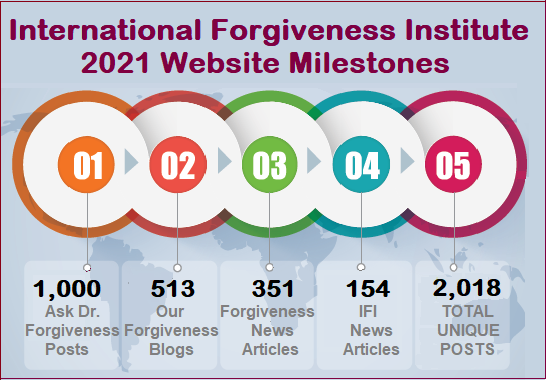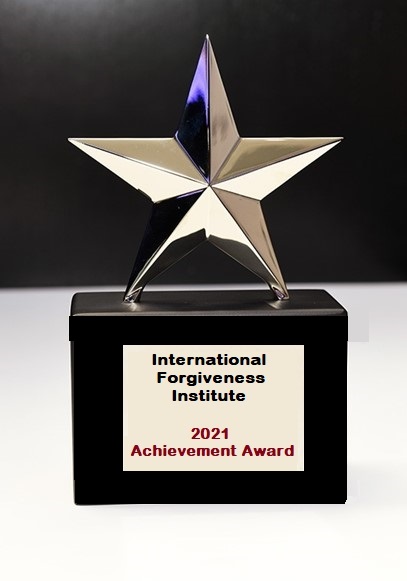Tagged: “forgiveness”
Can healthy anger eventually develop into unhealthy anger?
Yes, this is possible. When treated unfairly by others, it is natural to have some anger because this is showing the other and you that you are a person of worth who should not be treated this way. If you continue to think about what happened, and if the anger starts to grow more deeply and pervasively, then you need an outlet for this development. Forgiving can be such a response. If, however, you do not have any outlet at all and continue with the rumination on what happened, then that anger can become so deep that over a period of time (perhaps many months) it develops into the unhealthy kind, leading to possible anxiety, depression, sleep disturbances, and even hatred toward the other. Forgiveness is an important antidote to all of this.
In forgiving, how can we balance self-care and dealing with continued verbal abuse from the person who just will not shut off that kind of abuse?
When you forgive, you do not have to stay in the situation and take continual abuse that is wearing you down. You may need to take some time out from the interaction. Please try to remember that to forgive is not the same as to reconcile. If the person continues the abuse, despite your best efforts to have it stopped, and if the abuse is wearing you down, then taking some time away from the interactions with the other is a good idea for self-care. When you forgive, you also should ask for fairness from those who are hurting you. Some will refuse, and this is why we need to distinguish forgiving and reconciling.
I was asked to forgive. I still was fuming with anger. I did say, “I forgive you,” but with the promise to myself that I would work on forgiving the person. Now I feel as if I am a hypocrite because I used the words of forgiveness with deep anger in my heart. So, am I a hypocrite for doing this?
When you used the words of forgiveness, you most certainly had the best of intentions because you made a promise to yourself to continue the forgiveness process within your own heart (and probably in how you interact with the person). To be a hypocrite is to act in contradiction to your own beliefs or even your own intentions. Your intentions have been honorable regarding forgiveness. While you were not feeling very forgiving yet, you were making a heroic commitment to it. This shows consistency between what you said and what you intend to do. Therefore, you were not acting in a hypocritical way.
Your forgiveness process suggests that we need to take time before we forgive. Is it ever all right to start forgiving from the very beginning, when the hurt is fresh because the injustice just happened?
Most people are not ready to forgive right away because they need a period of calming down, of being angry, and of exploring what happened. This, however, does not imply that no one begins to forgive immediately. If you are treated unfairly and are well-practiced in the art of forgiving, then going ahead right away with some of the forgiveness exercises is fine. This might include, for example, beginning to see the inherent worth in the one who hurt you.
“The World’s Largest Portal to Anything and Everything Forgiveness-Related”
“Ask Dr. Forgiveness” is a dedicated column on the IFI website where users can ask questions related to even the toughest forgiveness topics and receive an informed response directly from IFI co-founder Dr. Robert Enright who is often referred to as “Dr. Forgiveness.” It is the IFI’s most popular website component and has garnered questions from individuals across the globe who are seeking answers and information on forgiveness-related topics.
As illustrated in the info-graphic at right, the IFI’s “Our Forgiveness Blog” section contains the second-highest number of website entries. Every one of the 513 entries in that section has been personally written by Dr. Enright (with the exception of a few guest blogs from prominent forgiveness advocates).
personally written by Dr. Enright (with the exception of a few guest blogs from prominent forgiveness advocates).
Those IFI followers who track Dr. Enright’s blogs have learned about the wit and wisdom of his 35-years pursuing scientific forgiveness research, the meticulous validation of his scientific procedures, his prominent international role in creating forgiveness education curricula, and his dominance in developing forgiveness therapy interventions.
In addition to those 500+ essays on the IFI website, Dr. Enright has also authored 86 additional blogs for his column called “The Forgiving Life” that runs monthly in the magazine Psychology Today. That publication, which focuses on mental health and behavioral science issues, established its partnership with Dr. Enright more than five years ago.
“The 2,000+ milestone we just reached with our blog and news sections is a hugely significant accomplishment,” according to Dr. Enright. “Compared to other websites that focus on moral development, the IFI website is by far the world’s largest portal to anything and everything forgiveness-related.”
 Part of the reason Dr. Enright can make that claim is because of his life-long aspiration to share the unvarnished results of his scientific research and interventions with not only interested scholars but with other psychologists, psychotherapists, and, essentially, the entire world.
Part of the reason Dr. Enright can make that claim is because of his life-long aspiration to share the unvarnished results of his scientific research and interventions with not only interested scholars but with other psychologists, psychotherapists, and, essentially, the entire world.
That’s why the IFI website now contains the full texts of many research documents produced by Dr. Enright and his research teams (available at no cost). Additionally, the site contains the full documentation (including instructions and scoring algorithms) for the most popular research tools Dr. Enright created during his career (again, available at no cost). In just the past three weeks, those tools have been accessed by scientists and clinicians from 21 different US states and 17 foreign countries.
“We provide all those resources on our website because we want to expand the availability of crucial forgiveness knowledge,” Dr. Enright says. “Our goal is to reach across continents to help satisfy man’s innate curiosity about forgiveness and to help disseminate the good news about the abundant benefits of the virtue of forgiveness.”



